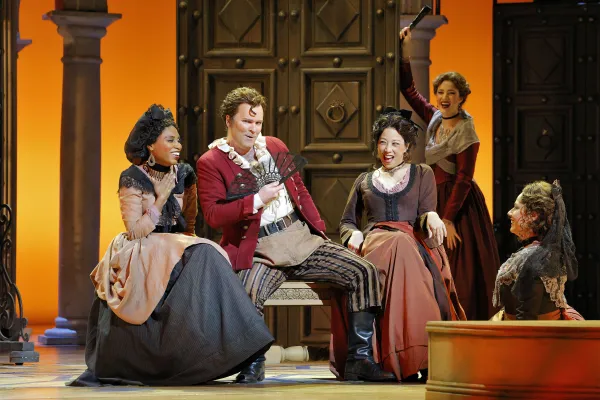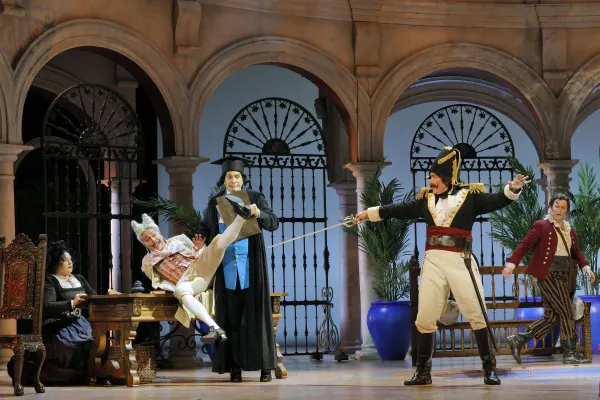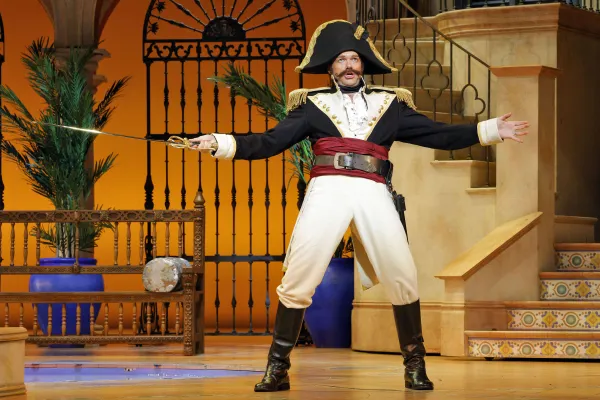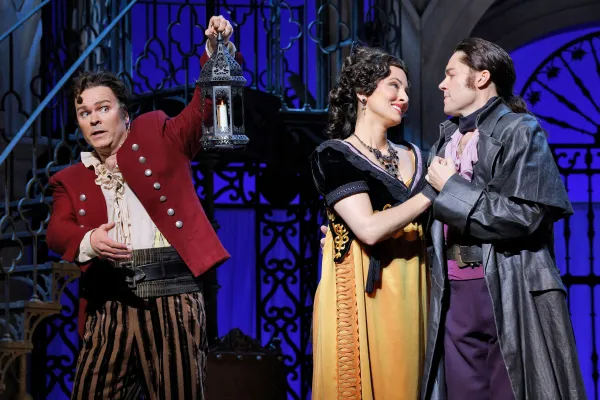All Photo credit Cory Weaver, Joshua Hopkins as Figaro in LA Opera's 2023 production of "The Barber of Seville."
From global broiling to plagues to wars at Ukraine and the Middle East to mass expulsions/ Exoduses of civilians from Gaza and Nagorno Karabakh to the homeless epidemic to the rising scourge of domestic fascism and beyond, our beleaguered planet is reaching the boiling point. What’s a human to do? Aside from a worldwide socialist revolution to bring about an international workers’ paradise, I have another suggestion (if not a solution) as to how to cope with these mounting crises: Go see/hear Gioachino Rossini’s 1816 The Barber of Seville at LA Opera.
Along with endless laughs, Rossini’s rollicking comic opera arguably includes some of the best music ever composed, set to a love story based on Beaumarchais’ 18th century play, with a libretto by Cesare Sterbini. Smitten by the beauty of the elusive, reclusive Rosina (New York mezzosoprano Isabel Leonard), Count Almaviva (Uruguayan tenor Edgardo Rocha) woos his intended, who is kept under lock and key in the spacious home owned by her much older, mean-spirited, conniving, greedy guardian Dr. Bartolo (played with great comedic brio by Italian bass-baritone Paolo Bordogna from Oct. 21-Nov. 4, and by NY bass-baritone Patrick Carfizzi Nov. 9-12). To win the confined Rosina’s affections, Count Almaviva employs a troupe of minstrels with mandolins and other instruments to serenade her at dawn.
But when this musical escapade is botched, the Count turns to the title character, the supremely self-confident Figaro (Ontario baritone Joshua Hopkins). As the titular barber, this sly jack-of-all-trades is a cross between a jackanapes and Jumping Jack Flash. Figaro is emblematic of the emerging artisan class of 17th century Europe, skilled workers who were also self-employed businessmen in that they sold their labor and talents. In his extremely boastful aria wherein he famously croons “Figaro! Figaro!”, the barber sings about how much money he makes by plying his trade (unlike the Count, by the way, who – although he may have more dinero than Figaro – has inherited, not earned his fortune). Accompanied by an adoring group of women, Figaro also seems to be a ladies’ man.
In addition to cutting hair and shaving beards, Figaro has another talent. Figaro is also the town’s fixer, a mover and shaker who – unlike Showtime’s brawny Ray Donovan – gets things done not through violence but via his guile and cunning. Aware of the beautician’s reputation, Count Almaviva hires Figaro to hook him up with Rosina, who – enamored by her sizable dowery, if not beauty – Dr. Bartolo intends to imminently wed. What’s a suitor to do?
The barber and count’s comic quest for Almaviva to elude Bartolo and win Rosina’s heart is full of trickery, chicanery, schtick, vaudevillian antics and slapstick worthy of the silent cinema – although with Rossini’s glorious music dominating all of the unfolding action, this opera buffa is anything but silent. There is also that old chestnut of mistaken or hidden identity. Much to his credit, Count Almaviva conceals his noble title and fortune from Rosina, fobbing himself off as Lindoro, a common man. The nobleman does this because he wants Rosina to love him for himself – not for his status, power and wealth, which is admirable.
All this tomfoolery graces the stage of the Dorothy Chandler Pavilion with great comic panache. Bordogna, who sports a wig bearing a goofy hairdo (Englishwoman Catherine Zuber is the costume designer), displays drollery worthy of those early silent screen comedians. He puts the “buffa” into opera buffa. The braggadocio and bluster of Hopkins’ Figaro is also a source of much recurring merriment. And not to be overlooked, toward’s the finale, the beautiful Leonard’s Rosina performs an Edward Everett Horton-worthy double-take. And so on.
Beneath the buffoonery are some serious matters Rossini lightly touches upon and glosses over with comedy. For instance, “Lindoro” and Rosina may be “madly” in love, but they barely know one another. Indeed, they decide to elope without ever having had a full conversation. They may be infatuated with and sexually attracted to one another, but do they really and truly “love” each other? Rosina’s aforementioned surprised reaction is because she really has no idea (literally!) who “Lindoro” is, and is thus easily hoodwinked and maneuvered by the scheming Bartolo.
Although Barber is played mostly for laughs, the plot alludes to the issues of class and especially to the plight of women in 17th century patriarchal Europe (and which continues today to various degrees, alas). Rosina is subject to the whims of her guardian, Dr. Bartolo, and is literally at times his captive. In the opera, the only way out for her from her servitude and house arrest under Bartolo’s thumb and watchful eyes is through a relationship with another man – albeit the younger, more handsome Lindoro/Almaviva. (In Mozart’s The Marriage of Figaro, also based on Beaumarchais’ plays, we see how this worked out for her – and for that matter, the future interactions between Count Almaviva and Figaro, who become adversaries. Although Mozart’s The Marriage of Figaro actually premiered 30 years before Rossini’s opera, Barber is the first comedy in Beaumarchais’ trilogy, while Marriage is the second. See: https://hollywoodprogressive.com/music/figaro-flips-the-script.)
But amidst all of the madcap amusement these more serious points are not accentuated. Above all else, Rossini’s music, capably conducted by New Yorker Louis Lohraseb, is quite grand throughout, sonorously sung by the leads and ensemble (Montanan Jeremy Frank is chorus director). A stand out is Pennsylvania soprano Kathleen O’Mara as the maid perfectly performs a solo aria, “Il vecchiotto cerca moglie,” wherein her puzzled character ponders that “Crazy little thing called love,” as Freddie Mercury put it 160-years later. West Virginian director Rob Ashford helms the sprawling mayhem ably and with a humorous touch throughout. And mention must be made of the often orange-hued lighting the dramatis (“comicus”?) personae are backlit by (the original lighting design is by London’s Howard Harrison and Mexico’s lighting designer Pablo Santiago is the lighting designer).
Rossini’s laugh out loud immortal masterpiece may not halt the barbarians at the gates, but enjoying The Barber of Seville can help to recharge one’s batteries and empower viewers/ listeners to go more placidly through the noise and haste of modern times and remember what peace there may be in music, to paraphrase Desiderata. Rossini’s ebullient message in the opera’s concluding chorus – “Amor e fede eterna, si vegga in noi regnar!” or :“May love and faith eternally be seen to reign in us!” – can buoy our battered spirits. The sentiment still rings true and was, of course, the early 19th century equivalent to the Fab Four’s “All You Need is Love.” By removing ourselves from worldly woes for three hours-plus, a great work of art can revive us and empower audiences to better confront planetary troubles. To survive our cold cruel world, one can never get enough joie de vivre – or should I quip “Joie de Almaviva”? LA Opera’s Barber definitely makes the cut.
The Barber of Seville is being performed Sundays, Oct. 29 and Nov. 12 at 2:00 p.m.; and on Thursdays, Nov. 2 and Nov. 9, and Saturday, Nov. 4 at 7:30 p.m. at the Dorothy Chandler Pavilion, 135 N. Grand Avenue, Los Angeles CA, 90012. For tickets: https://www.laopera.org/performances/202324-season/the-barber-of-seville/; (213)972-8001. The Barber of Seville is sung in Italian, with English supertitles.






